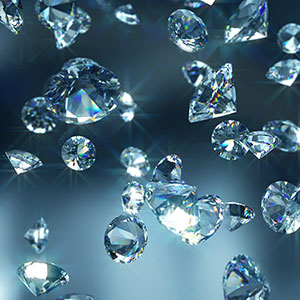
The G7’s ambitious plan to ban Russian diamonds by routing every stone through a single “rough node” based in Antwerp is losing support among member nations, sources involved in the matter tell JCK.
Currently, only the European Union (EU) is said to favor the plan for a sole Antwerp node; representatives of the United States, the United Kingdom, and other countries have all expressed reservations about it.
It’s difficult for anyone to make a final judgment about the plan because there are still many unanswered questions. Among the issues yet to be resolved: how to treat “grandfathered” goods, and whether lab-grown diamonds, diamonds watches, and mounted jewelry would be subject to the restrictions. In December the EU indicated the sanctions would cover those three categories of goods, but now it appears that hasn’t actually been decided (like many things related to implementing the sanctions).
Opposition to the single “rough node” has come from strong lobbying by the trade, including De Beers’ hiring of lobbying firm Brownstein Hyatt Farber Schreck. But the heads of African nations, who have long been skeptical of the Antwerp plan, are also speaking out—even if, theoretically, they have the most to gain from less competition from Russian gems.
The presidents of Angola, Namibia, and Botswana sent letters to President Biden and other heads of G7 nations expressing concerns about the new restrictions, sources say. That led in part to the mix of regulations that were enacted in the first group of sanctions March 1, with the EU requiring hard evidence of non-Russian origin and the United States opting for “self-certification.”
If the EU’s Antwerp proposal is shot down, it’s not clear what will replace it—De Beers and African nations support setting up “rough nodes” in Africa’s diamond-producing countries (as well as in G7 member Canada). It’s also possible an entirely new scheme will be developed—for all the disagreements, the G7 overall remains committed to banning Russian gems.
For the moment, the EU remains committed to the Antwerp plan, which Everledger is piloting during the March-to-September “sunrise period.” And while some notable names have shown interest in joining in the test, delays shipping diamonds into Antwerp have made it difficult for even willing parties to participate. Still, the EU shouldn’t be underestimated; it holds considerable sway, as most of the major luxury conglomerates—including the biggest one of all, LVMH—are based in Europe.
And in some ways, the plan is working as it should: Since March 1, at least three shipments were halted before they entered Belgium, because of suspicions they contained Russian goods.
(Photo: Getty Images)
- Subscribe to the JCK News Daily
- Subscribe to the JCK Special Report
- Follow JCK on Instagram: @jckmagazine
- Follow JCK on X: @jckmagazine
- Follow JCK on Facebook: @jckmagazine






